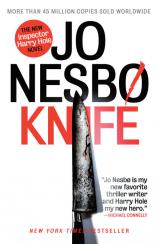Knife: A Harry Hole Novel
Review
Knife: A Harry Hole Novel
- Click here to read Barbara Lipkien Gershenbaum's review.
KNIFE is a sterling example of Jo Nesbø’s considerable literary talent. I can’t think of anyone else who can take the apple cart --- which he has constructed carefully over the course of what is now 12 novels in the Harry Hole series --- and not only kick it over, but also jump up and down on it until it is reduced to splinters, then carefully attempt to reconstruct it. That is essentially what Nesbø does in this delightfully dreary and depressing tale that seems as if it is doomed to end badly.
I really shouldn’t tell you anything else about KNIFE. Nesbø --- aided once again by Neil Smith’s superlative translation --- puts the wrap on a number of plotlines that have been bubbling under the surface over the course of 11 novels and, perhaps, introduces a few new ones that will play out over the next dozen or so books in the series if he isn’t bringing it to an end. With Nesbø, you never know. And I mean you NEVER know, particularly where Harry Hole is concerned.
"KNIFE is a critical book in a series that is one of the most important in contemporary crime and police procedural fiction. Don’t miss it."
So what should I tell you about KNIFE that won’t spoil everything? To start with, the domestic tranquility that Harry apparently had is history. As the book begins, he is drinking and is back with the Oslo police, but working in the concentric ring of Hell known as the Cold Case office. Even worse, his wife Rakel has kicked him out of the house. Svein Finne, a criminal who is a household name in Norway for all the wrong reasons, is out of prison. Harry was the one who helped to arrest Finne --- known as “The Fiancé” --- and put the notorious rapist and serial murderer in prison. Yes, Harry’s life is in the bogs in every conceivable way.
Then the worst happens --- and no, I won’t tell you what that is, just trust me --- and it slowly but inexorably becomes clear that it is Harry who is at fault. And yes, Harry himself comes to conclude that he is responsible for the act that will make his life going forward not worth living, for all intents and purposes. Of course, he knows a lot more than the reader about what has happened in the past and what he is planning for the present and the future, and doles out the nuggets of knowledge and revelation in a miserly manner.
However, a wise man knows what he doesn’t know, and it takes Harry a step or three uninhibited by alcohol to realize that there are a couple of facts left lying in the darkness that he has tripped over once or twice but hasn’t picked up. Once he grasps them, though, it may be too late. Or not. If Nesbø has taught us anything over the course of this series, it is that his protagonist should never be counted out, even when he is seemingly down and buried.
If you have never looked at a single word of these books, you could still pick up this latest installment, read it, understand it and enjoy it. Nesbø doesn’t give neat little summaries of what has gone before, but he leaves digestible nuggets and nibbles along the path of the story to allow any newbies (and those of us of a certain age) to surmise what has gone before. KNIFE is a critical book in a series that is one of the most important in contemporary crime and police procedural fiction. Don’t miss it.
Review #2 by Barbara Lipkien Gershenbaum
KNIFE by Jo Nesbø is an extremely tense, twisty and enthralling police procedural. Rogue detective Harry Hole is as drunk as ever, despite his constant attempts to stay sober. He is hunting a known rapist-murderer while trying to come to terms with a great tragedy in his life. On leave from the department for improper behavior, his hold on his sanity is tenuous and slowly draining all of his energy.
As a result of his suspension, Harry finds himself with no choice but to embark on his own private investigation. “Twenty-five years’ experience as a murder detective had taught Harry that the chain of events was almost always more complicated and incomprehensible than it seemed at first.” Therefore, he spends more time alone than his co-workers do.
Chief of Police Gunnar Hagen decides to bring in Kripos, “which assisted local police in serious criminal cases such as murder.” A level of high competition exists between the two entities. Bringing in this other unit is, in Harry’s opinion, wise of Chief Hagen, “given that the victim’s partner was employed in the Crime Squad Unit at Police Headquarters in Oslo.”
"...an extremely tense, twisty and enthralling police procedural.... The tension is at a breakneck speed, and the plot falls together in a very believable story."
As the narrative unfolds, Harry is torn by the emotional attachments that the women in his life impose on him. He has one true love yet finds it hard to stay loyal to her, and she is always questioning their relationship. She has a son named Oleg, who thinks of Harry as his father. Paternity raises questions about a baby born to one of his colleagues.
In order to remember incidents that have faded in Harry’s mind, he allows himself to be hypnotized. Stale Aune is the psychologist who performs this sort of therapy on the detective to help him retrieve memories he has lost over time. Svein Finne is the killer-rapist Harry is tracking. Because he is not part of the investigation, those who assist him must keep their work with him a secret.
Another character who plays a major role in Harry’s life is Bjørn Holm, who has been on paternity leave. He walks into the area Harry is occupying, and they talk about the case despite only one of them being on active duty. Holm tells Harry: “…my work’s as good for Kripos as it is for the Oslo Police District.”
KNIFE is a profound police procedural. Nesbø does a lot of philosophizing and limns his characters in great detail. Despite being the 12th book in the series, readers can enjoy it as a stand-alone. The tension is at a breakneck speed, and the plot falls together in a very believable story.
In an interview, Nesbø says of Harry Hole: “He is, in many ways, a traditional detective hero, meaning that he is a hard drinker, hard worker, a loner. But then again he is a realistic guy. He is also a full-blown alcoholic. He is not the typical hard-boiled American detective, who is a hard drinker and who wakes up in the morning making cool remarks about his hangover. When Harry starts drinking he stops functioning. He can’t work.”
When asked if the character was developed consciously, Nesbø said that by the third novel he realized that Harry was going to be around for a while: “But by now it seems like I am going to follow Harry all the way through the end. And there will be an end.”
Reviewed by Joe Hartlaub and Barbara Lipkien Gershenbaum on July 19, 2019




